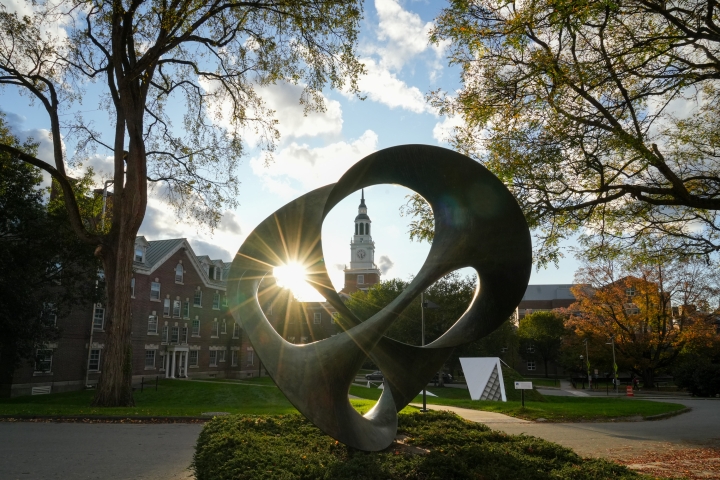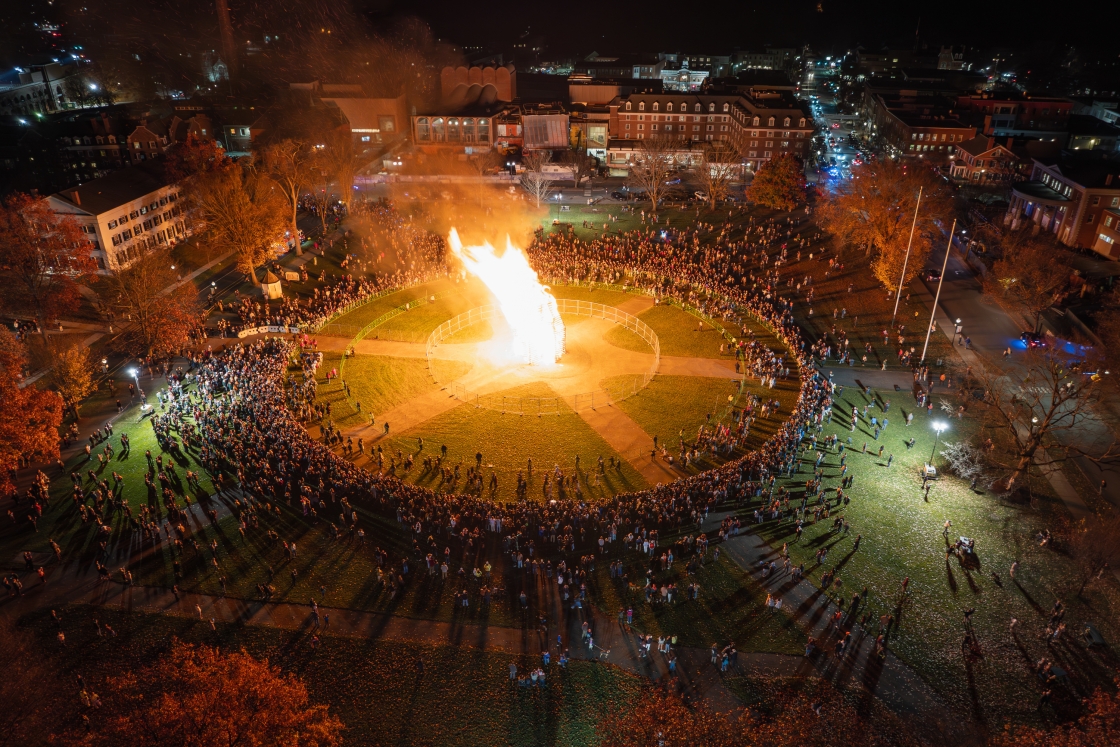Members of the Board of Trustees got a close-up look at Dartmouth’s future during their Sept. 13-14 meetings as they toured the construction site for an apartment-style undergraduate residential complex, saw the expanding network of piping being installed under walkways for the developing geo-exchange heating and cooling system, and marveled at progress made on the ongoing transformation of the Hopkins Center for the Arts.
“The board came away from our meetings energized by all that has been accomplished during the last year at Dartmouth,” said board Chair Elizabeth Cahill Lempres ’83, Thayer ’84. “We’re looking forward to building on that progress in what is sure to be a busy academic year.”
Presidential Priorities: Energy and Housing
Trustees heard details on two extensive, campus-wide initiatives that are among President Sian Leah Beilock’s key strategic priorities—the program to build new and renew existing housing and the energy transition from fossil fuel to a sustainable, carbon-free future. Dartmouth has made significant progress in the last year on each of the undertakings, said Josh Keniston, senior vice president for capital planning and campus operations.
“The trustees were thrilled to see Dartmouth’s comprehensive housing strategy come to life with the breaking of ground on a new residence hall—supported by an extremely generous $30 million gift announced Tuesday from Class of ’77 members Tom and Gina Russo—and that our transition to a more sustainable campus is rapidly moving forward,” said Lempres. “As we walked around town and through campus, we were inspired as we could begin to visualize what future Dartmouth will look like.”
During her 2023 inauguration, President Beilock committed to investing in housing as critical in supporting the health and wellness of the community and the Dartmouth residential experience. She pledged to add a total of 1,000 new beds for undergraduate and graduate students, faculty, and staff over the next decade.
Trustees saw what will be the first undergraduate residence to be built in a generation at 25 West Wheelock St. In June, Dartmouth purchased several properties on the well-traveled hill that is the gateway to campus with plans to develop apartment-style housing for juniors and seniors on the West End of campus, a major gateway to Dartmouth and Hanover.
Russo Hall, set to open in fall 2026, is the first new building project in the $500 million housing strategic plan to build new and renew existing residence halls, including work on Fayerweather Hall which began this summer. More housing announcements concerning faculty and staff as well as graduate students are expected later this year.
On the energy front, Keniston explained the ongoing energy transition, a major part of the $500 million Dartmouth Climate Collaborative announced in April. He reported progress on Dartmouth’s goal of reaching carbon-zero in its operations by 2050, with a 60% reduction by 2030 when measured against 2010 baseline carbon emissions. To date, a 25% reduction has been achieved at the same time Dartmouth has added to building square footage by 13%.
Dartmouth is transitioning from fossil fuel-burning technology to combustion-free systems such as heat pumps and geo-exchange borefields that will run on electricity. Construction started in a number of locations on campus this summer with the installation of piping and electrical duct banks for the geo-exchange system, with the drilling of the first geo-exchange borefield tentatively set to begin in mid-November.
“Over the last year, significant energy transition work has been done to design solutions for the Athletics District, East Wheelock District, and West End District of campus,” Keniston said. “With designs now ready, we are entering the execution phase for these first districts, and the pace of construction is increasing on campus.”
Presidential Report
Beilock’s report to the board included discussion of her commitment to supporting opportunities for productive dialogue, discussion, and debate for all students—and the larger campus community. She commended faculty and students for leading the way on creating events to offer such opportunities. Later this month, the Rockefeller Center 2024 Election Speaker Series, featuring a group of ideologically diverse guests, will begin, followed by a student-run Dartmouth Political Union series of debates.
Admissions: Most Socioeconomically Diverse Undergraduate Class
The undergraduate Class of 2028 is the first to enroll at Dartmouth since the income threshold for a “zero parent contribution” increased from $65,000 to $125,000, the highest such threshold in the nation. More than one in five students in the new class, or 22%, qualified for this new policy.
In addition, the new undergraduate class sustained the degree of racial and ethnic diversity that characterized recent entering classes at Dartmouth, Lee Coffin, vice president and dean of admissions and financial aid, told trustees.
“The key takeaway at this preliminary stage is that the class composition across Dartmouth’s undergraduate, graduate, and professional degree programs remained consistent with previous classes or increased in most of the cohorts,” he said.
Of the 1,184 students in the undergraduate Class of 2028, drawn from 1,003 high schools around the world, a record-setting 17% of them are in the first generation in their families to go to college. And the number of Pell Grant recipients increased by 5 percentage points to 19.4%, an all-time high for Dartmouth.
Endowment Returns
For the fiscal year that ended on June 30, Dartmouth’s endowment generated an investment return of 8.4%, with longer-term annualized returns of 10.9%, 9.4%, and 9.5% over the past five, 10, and 20 years, respectively, Investment Office CEO Alice Ruth ’83 and Chief Investment Officer Kelsey Morgan ’02, Tuck ’08, said during their presentation to trustees. The endowment’s value stood at $8.3 billion on June 30, after distributing nearly $430 million throughout fiscal year 2024 to fund 28% of the annual operating budget.
“Dartmouth is fortunate to have a talented investment team capable of generating sustainable long-term returns that not only benefit Dartmouth community members today, but ensure that future generations will have access to the same world class education, resources, and transformative experiences,” said Beilock.
“Over the past 10 years, the endowment distribution—the funding that goes directly to support financial aid among other programs critical to Dartmouth’s functioning—has more than doubled, directly supporting our mission of offering a world-class academic experience and ground-breaking research while significantly expanding financial aid programs to offer one of the most affordable undergraduate degree programs in the country,” she said.
New Trustees, a New Degree, and New Ways of Thinking
Trustees welcomed the board’s three new members—David Grain, Tuck ’89, Will Griffith ’93, and Maia Josebachvili ’05—to their first meeting.
“We’re glad to have new ideas and contributions from Maia, Will, and David,” Lempres said, adding that the board is also grateful for the service of Jeff Blackburn ’91 and Erica Schultz ’95, who this summer each completed two terms on the board.
Board members also approved the establishment of a new professional degree in the Guarini School of Graduate and Advanced Studies, the master of energy transition to be jointly run by Guarini and the Arthur L. Irving Institute for Energy and Society. This marks the first degree program involving the seven-year-old institute.
“We are pleased to support the Irving Institute’s first-ever master’s degree, a groundbreaking, interdisciplinary program. Sponsored by the Guarini School, this program will prepare students to lead in the rapidly advancing field of energy transition,” said Guarini Dean Jon Kull ’88.
The first group of students will arrive on campus in fall 2025, said Geoffrey Parker, professor of engineering innovation, and interim faculty director of the Irving Institute.
“We are thrilled to bring together all corners of campus to advance our shared goal of accelerating global decarbonization and welcome a new generation of energy leaders,” he said. “Dartmouth’s interdisciplinary environment offers the ideal foundation for preparing early-stage professionals to lead the global clean energy transition. The master’s in energy transition leverages Dartmouth’s strengths in fostering multidisciplinary communities to drive innovative solutions to the world’s most pressing challenges.”
And board members heard a presentation on artificial intelligence by Associate Professor of English and Creative Writing Jed Dobson, who is serving as special advisor to the provost for AI; and assistant professors Sarah Preum, in computer science, and Aravindhan Sriharan, in pathology and laboratory medicine.


